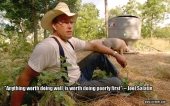I like this.
I often find myself in discussions about how we make our money.
One book that I often refer to is
The Cashflow Quadrant by Robert Kiyosaki (perhaps better known as the author of
Rich Dad, Poor Dad.)
The premise of the book is that people get their money in one of four ways, which we can visualize like this:
E|B
S|I
Where E=employment, S=self-employment, B=Business ownership, and I=Investing
He doesn't pass MUCH judgement on any of the four quadrants, except to say that it is better to be on the right side than the left side.
It seems most people think of earning money in the E quadrant, i.e. get a job working for someone else. It is sort of the default model for our society. At first glance, people assume that it is the "safest" path, trading time for money.
After a series of utterly ridiculous circumstances, I discovered that I'm not cut out for traditional employment, so I became an S. (This was before I read the book).
As a self-employed person, I am my own boss. I've been working as a freelance language consultant for close to ten years, and it has been nice to have the flexibility to set my own hours, and in some cases, my own wages. After my son was born handicapped, it became quickly clear that working a standard 40 hour/week job would be impossible in light of all the additional medical needs, planned and unplanned.
But one of the biggest drawbacks to being an S is that when I stop working, the money stops flowing. I don't get paid vacation, I just get to choose when I want to take a break from earning. The effects of this are most often felt in the doldrums surrounding summer and Christmas, when my clients, earning from the E quadrant, take their paid vacations, leaving me with less work but no intention of taking a vacation.
More specifically to me, it also usually includes an hour commute to companies I don't align with philosophically, such as large chemical or pharmaceutical companies.
To offset some of these issues, I started doing media production in 2012. This is what I was trained in before moving to Europe, so it was a return to my first love, which had to be set aside temporarily while I had more pressing matters of learning a language, adapting to a culture, and finding a way to make money immediately while getting settled.
Business owners, on the other hand, own the process by which the money is made. Essentially, B people own the Cash Cow and pay a modest wage to E people to
milk it. They can also pay themselves to milk it if they choose, or they can walk away. And the milk keeps flowing, with or without their input.
Investors use money to make more money. There's obviously more to it than that, but nothing I want to expand on here.
The only quadrants relevant to residual income are B and I, on the right side.
At the moment, I have two primary streams of income with which I have been earning for several years, but both are in the S quadrant.
However, in the second half of last year, I started renting out my studio space on airbnb, and I have to say that it's been a remarkable
experience so far.
Now obviously, your mileage may vary, but my studio is unique, quite large, centrally located in a
city that attracts people from all over the world due to its tourist charms as well as in connection with the university. I rent it out at a moderate price, and so far for 2016, I'm averaging a 40% booking rate and airbnb has almost matched my monthly income from what I earn as a freelancer.
All this in exchange for about an hour of cleaning and setting up, maybe 15 minutes of meeting new guests and handing over a key, and as much time as it takes me to shove towels and bedsheets into the washing machine, per reservation, which, for 2016 so far, has been 12, so average of 7.5 hours of work per month.
I suppose this isn't exactly residual income, but it certainly is significant income, with comparatively little input on my part. This feels like it fits squarely into the REIH model, unless there's something I'm missing.
I also have a few different "true" residual income streams in the works, but having had no experience with this model so far, I don't know what to expect until it happens. But as you say, try 100 things....

















 1
1











